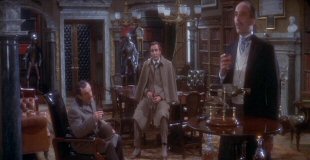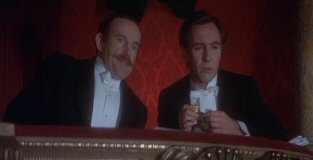The Private Life of Sherlock Holmes (Billy Wilder, 1970)
 The Private Life of Sherlock Holmes,
Billy Wilder’s excellent extension of Arthur Conan Doyle’s series of popular
detective novels, is a risky attempt to transform one of pop culture’s key
figures into something a bit more human. On its surface a forgotten entry into
the series of the detective’s great cases, the film in many respects plays
much like any other adventure that the world’s most filmed character has
partaken. It revisits a familiar setting and characters that fans have grown to
love, and inserts particularly Holmes-ian touches into its mystery such as the
inclusion of the Loch Ness Monster, midgets, and an amnesiac. Still, Wilder is
after something more profound than a simple mystery tale here, and to a large
extent he succeeds in his quest to cast Sherlock Holmes, the man, in relief when
held up against Sherlock Holmes, The Legend. As played by the brilliant Robert
Stephens, this film’s Holmes is a mess of contradictions and compromises so
convincing that it is likely to make one question the unfettering stoicism that
other Holmes films feature.
The Private Life of Sherlock Holmes,
Billy Wilder’s excellent extension of Arthur Conan Doyle’s series of popular
detective novels, is a risky attempt to transform one of pop culture’s key
figures into something a bit more human. On its surface a forgotten entry into
the series of the detective’s great cases, the film in many respects plays
much like any other adventure that the world’s most filmed character has
partaken. It revisits a familiar setting and characters that fans have grown to
love, and inserts particularly Holmes-ian touches into its mystery such as the
inclusion of the Loch Ness Monster, midgets, and an amnesiac. Still, Wilder is
after something more profound than a simple mystery tale here, and to a large
extent he succeeds in his quest to cast Sherlock Holmes, the man, in relief when
held up against Sherlock Holmes, The Legend. As played by the brilliant Robert
Stephens, this film’s Holmes is a mess of contradictions and compromises so
convincing that it is likely to make one question the unfettering stoicism that
other Holmes films feature.
 This Sherlock’s ingrained distrust of
the opposite sex and his unwillingness to indulge in anything as reckless as
emotional passion make him a great detective (and make the excitable Watson a
perfect comic foil), but they also make him eerily similar to Star Trek’s Mr.
Spock in the way that he puts his logic before his heart. What’s interesting
about this attitude toward the detective are the ways that the mystery that he
investigates during the course of the film comment directly on that questionable
mindset. Through a series of plot twists, we see how Wilder’s attitude toward
Holmes grows increasingly complex. In the very first scenes of the film, Wilder
begins what would almost feel like an attack on the character’s character,
were it not for later compassion the film shows him. Holmes is not only
presented as an inferior version of the figure we know from the familiar stories
(he can’t play the violin nearly as well as one might think, for example), but
also as a dope fiend who makes excuses for his addiction and, for a moment or
two, as Watson’s gay lover. As the story proceeds, he’s blessed with his
usual, uncanny deductive skills, but he’s also revealed as man who’s
pragmatic to a fault, and his unwavering faith in his logic becomes problematic
when he, inevitably, begins to become emotionally involved in an assignment. By
the film’s end, his great intellect has become a huge liability, his
reputation has turned into an outright burden, his greatest liability becomes a
refuge, and his figure can only be looked at with much uncertainty. Yet for all
of that doubt, the film doesn’t feel like a nasty look at the beloved
character. If anything, its poignancy begs why Arthur Conan Doyle himself hadn’t seen the
same dangerous compulsions in his creation and examined them.
This Sherlock’s ingrained distrust of
the opposite sex and his unwillingness to indulge in anything as reckless as
emotional passion make him a great detective (and make the excitable Watson a
perfect comic foil), but they also make him eerily similar to Star Trek’s Mr.
Spock in the way that he puts his logic before his heart. What’s interesting
about this attitude toward the detective are the ways that the mystery that he
investigates during the course of the film comment directly on that questionable
mindset. Through a series of plot twists, we see how Wilder’s attitude toward
Holmes grows increasingly complex. In the very first scenes of the film, Wilder
begins what would almost feel like an attack on the character’s character,
were it not for later compassion the film shows him. Holmes is not only
presented as an inferior version of the figure we know from the familiar stories
(he can’t play the violin nearly as well as one might think, for example), but
also as a dope fiend who makes excuses for his addiction and, for a moment or
two, as Watson’s gay lover. As the story proceeds, he’s blessed with his
usual, uncanny deductive skills, but he’s also revealed as man who’s
pragmatic to a fault, and his unwavering faith in his logic becomes problematic
when he, inevitably, begins to become emotionally involved in an assignment. By
the film’s end, his great intellect has become a huge liability, his
reputation has turned into an outright burden, his greatest liability becomes a
refuge, and his figure can only be looked at with much uncertainty. Yet for all
of that doubt, the film doesn’t feel like a nasty look at the beloved
character. If anything, its poignancy begs why Arthur Conan Doyle himself hadn’t seen the
same dangerous compulsions in his creation and examined them.
 Though the emotional crux of the film is
rooted in the Sherlock Holmes mythology, it doesn’t take a huge leap of logic
to see how its questioning of a life spent overanalyzing could apply to a dyed
in the wool cynic like Wilder himself. Indeed, if anything is Holmes’ problem,
it’s that he’s too intelligent to convince himself that he’s happier than
he really is. His intelligence is a curse of sorts because it allows him to see
all too clearly the mistakes that he’s made and the hypocrisies of the world.
Thanking no one in particular that his failures not chronicled by Watson at the
end of the film, Holmes at once exhibits his well-deserved ego and his shame at
possessing it. Much like the film that surrounds him, this Holmes is too
self-aware to be content with easy answers or simple opinions of people, and
that makes him rather fascinating. That the solution to the mystery confirms the
director’s cynical worldview, despite any affection toward the central
characters or comic bits that were scattered throughout, suggests that the
self-reflection should be viewed more as awareness of Wilder’s own
predilections and less as an attempt to reform them. Whatever the case, The
Private Life of Sherlock Holmes offers a compelling what-if that seems much
at home in Wilder’s cinema of the ambivalent.
Though the emotional crux of the film is
rooted in the Sherlock Holmes mythology, it doesn’t take a huge leap of logic
to see how its questioning of a life spent overanalyzing could apply to a dyed
in the wool cynic like Wilder himself. Indeed, if anything is Holmes’ problem,
it’s that he’s too intelligent to convince himself that he’s happier than
he really is. His intelligence is a curse of sorts because it allows him to see
all too clearly the mistakes that he’s made and the hypocrisies of the world.
Thanking no one in particular that his failures not chronicled by Watson at the
end of the film, Holmes at once exhibits his well-deserved ego and his shame at
possessing it. Much like the film that surrounds him, this Holmes is too
self-aware to be content with easy answers or simple opinions of people, and
that makes him rather fascinating. That the solution to the mystery confirms the
director’s cynical worldview, despite any affection toward the central
characters or comic bits that were scattered throughout, suggests that the
self-reflection should be viewed more as awareness of Wilder’s own
predilections and less as an attempt to reform them. Whatever the case, The
Private Life of Sherlock Holmes offers a compelling what-if that seems much
at home in Wilder’s cinema of the ambivalent.
82
Jeremy Heilman
10-26-04